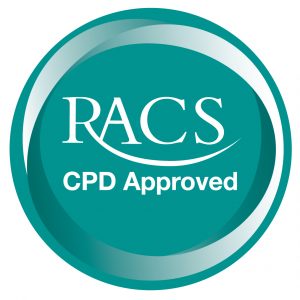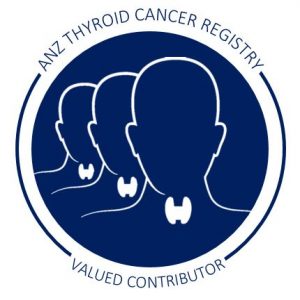INFORMATION FOR HEALTH PROFESSIONALS & RESEARCHERS
Aim
The ANZTCR’s primary objective is to identify unwarranted variation in the management, treatment and outcomes of patients diagnosed with thyroid cancer to improve quality of care. The aims are to:
- Better understand thyroid cancer incidence, treatment and outcomes
- Provide timely, risk-adjusted benchmarked reports of quality of care to participating clinicians and sites, enabling clinicians to measure clinical performance and identify areas for improvement
- Provide data for clinical and epidemiological research
Participants
Participants are eligible to participate in the registry if they are:
- Newly diagnosed patients presenting to a participating hospital with a confirmed primary thyroid cancer
- Aged ≥16 years of age at the time of diagnosis
- Have a diagnosis date that falls within the specified time frame for inclusion
- Diagnosed from the 1st September 2017 onwards
Recruitment
- Potential participants are identified by treating surgeons at participating hospitals
- The registry uses an opt-out approach for recruitment
- Potential participants are sent an Invitation Letter and Explanatory Statement
- Potential participants or their proxy have two weeks from the date on the Participant Invitation Letter to opt-out before any of their health information may be collected
- Participants can opt-out at any time and request their data be removed from the registry
Data Collection
- Clinicians or their delegated staff member collect data for the ANZTCR
- Data may also be collected electronically from surgeon or hospital databases
- The information collected includes: demographic, diagnostic, and treatment information
- Clinical quality indicators have been determined by a panel of experts through a modified Delphi
- The collection of patient-reported outcomes and experiences is currently being piloted through the registry
Recognising Surgeon Contribution
The significant and outstanding effort made and the support given to ANZTCR by many surgeons and their staff is worthy of distinction. The ANZTCR annually acknowledges surgeons who participate in the registry in a number of ways:
- The ANZTCR REDCap database allows surgeons to run patient-level and aggregate data reports in real-time
- The ANZTCR is recognised by the Royal Australasian College of Surgeons (RACS) as a Continuing Medical Education (CME) audit activity that aims to improve the quality of patient care
- Surgeons will also be provided with a copy of the logo to use at their discretion, i.e. on their email signature, important documents and letterheads, and website
Once the data is sufficiently mature the ANZTCR will produce:
- Annual reports to be made available to the steering committee, funders and participating sites/clinicians, as well as publicly on the ANZTCR website
- Benchmarked reports of clinical quality indicators will be available for participating sites
- Data access for research and non-research purposes (clinicians can access their own data through the registry)- For more information please see the ANZTCR Data Access Policy
If you would like to contribute to this registry please complete the Contributing Clinician Agreement form and email it to anztcr@monash.edu.
Frequently Asked Questions
What are Clinical Quality Registries?
- CQRs systematically collect data on all episodes of care relating to a patient’s diagnosis of a particular disease (i.e. upper GI cancers), with the aim of improving patient outcomes through the assessment of the quality of care provided by healthcare institutions.
- Data are used to inform pre-determined, disease-specific clinical quality indicators (CQIs) and participating sites are benchmarked against these CQIs in regular reports.
- When outliers are identified, sites are responsible for investigating the cause and implementing changes where necessary.
What is a clinical quality indicator?
Clinical quality indicators (CQIs) are the aspects of care that the ANZTCR will measure to assess the quality of care provided to patients in the registry. CQIs are based on published evidence or agreed ‘best practice’ and have been developed by a panel of experts through a modified-Delphi process.
Is the ANZTCR collecting patient-reported outcome measures?
The ANZTCR is currently piloting the collection of patient-reported outcomes (PROs) and experiences (PREs). PROs/ PREs will be collected at baseline (as close to diagnosis as possible) and at 3-, 6-, and 12-months post-diagnosis. Participants will be invited to complete the questionnaire via email or SMS sent by the registry.
Why is this project being conducted?
This registry has been established out of a desire to improve both the quality and length of survival for Australians and New Zealanders with thyroid cancer. Clinical quality registries achieve improvements in care primarily by informing health care providers how they are performing, compared with others. If a provider is falling behind on a performance indicator, compared with others, this provides them with both the information and motivation to improve. Thus reducing unwarranted variation in care and improving compliance with clinical guidelines, where they exist.
Who is operating the ANZTCR?
- The ANZTCR is run by the Cancer Research Program within Monash University’s School of Public Health and Preventive Medicine. The ANZTCR Academic Leads are Professor John Zalcberg and Professor Jeremy Millar, the Coordinating Principal Investigator and Clinical Lead is Professor Jonathan Serpell, and the ANZTCR Research Fellow is Dr Liane Ioannou.
- The development and operation of the ANZTCR is overseen by a Management and Steering Committee.
What does contributing to this registry involve?
To be a participating clinician you will be required to:
- Notify the ANZTCR coordinating centre of all newly diagnosed thyroid cancer patients by entering minimal patient details into the registry, in addition to confirming thyroid cancer diagnosis and patient disclosure.
- Enter complete patient data into the registry at 90 days post-surgery, including recurrence, if relevant.
How can I contribute?
If you are interested in being involved in the registry please complete the ANZTCR Expression of Interest Form and forward to the ANZTCR Coordination Centre.
If a relevant Human Research Ethics Committee has approved data being collected by the registry at your site please complete the Contributing Clinician Agreement form and email it to anztcr@monash.edu.
Can contributing clinicians access their registry data?
Clinicians contributing data to the ANZTCR, can access their own data via the ANZTCR REDCap Database (ANZTCR-RCD). The ANZTCR-RCD allows contributing clinicians to run patient-level and aggregate data reports in real-time.
What types of data are collected?
The types of data collected includes: demographics, diagnostic information, and treatment information.
Please contact the ANZTCR Coordinator for more detailed information regarding what is collected.


